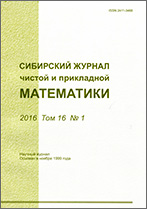|
This article is cited in 3 scientific papers (total in 3 papers)
A priori tame estimates for free boundary plasma–vacuum problem
N. V. Mandrik
Sobolev Institute of Mathematics, Siberian Branch of the Russian Academy of Sciences, Novosibirsk
Abstract:
We study the free boundary problem for the plasma–vacuum interface in ideal compressible magnetohydrodynamics. Unlike the classical statement, when the vacuum magnetic field obeys the ${\rm div}$-${\rm rot}$ system of pre-Maxwell dynamics, we do not neglect the displacement current in the vacuum region and consider the Maxwell equations for electric and magnetic fields. This work is a continuation of the previous analysis by Mandrik and Trakhinin in 2014, where a sufficient condition on the vacuum electric field that precludes violent instabilities was found and analyzed, the well-posedness of the linearized problem in anisotropic weighted Sobolev spaces was proved under the assumption that this condition is satisfied at each point of the unperturbed nonplanar plasma-vacuum interface. Since the free boundary is characteristic, the functional setting is provide by weighted anisotropic Sobolev spaces $H^s_*$. The fact that the Kreiss–Lopatinski condition is satisfied only in a weak sense yields losses of derivaties in a priori estimates. Assuming that the mentioned above condition is satisfied at each point of the unperturbed nonplanar plasma-vacuum interface, we prove that tame estimates in $H^s_*$ holds for the linearized problem. In future we are going to use those estimates to prove the existence of solutions of the nonlinear problem.
Keywords:
tame estimates, ideal compressible magnetohydrodynamics, vacuum Maxwell
equations, plasma-vacuum interface.
Received: 24.12.2015
Citation:
N. V. Mandrik, “A priori tame estimates for free boundary plasma–vacuum problem”, Sib. J. Pure and Appl. Math., 16:4 (2016), 72–96; J. Math. Sci., 230:1 (2018), 118–140
Linking options:
https://www.mathnet.ru/eng/vngu423 https://www.mathnet.ru/eng/vngu/v16/i4/p72
|

| Statistics & downloads: |
| Abstract page: | 131 | | Full-text PDF : | 44 | | References: | 26 | | First page: | 1 |
|




 Contact us:
Contact us: Terms of Use
Terms of Use
 Registration to the website
Registration to the website Logotypes
Logotypes








 Citation in format
Citation in format 
